
Image by Sajjad Hussein/AFP/Getty Images, © All Rights Reserved.
Being Brave Is Stepping Backward and Trusting Our Children
Your children are not your children.
They are the sons and the daughters of Life’s longing for itself.
They come through you but they are not from you,
And though they are with you yet they belong not to you.
You may give them your love but not your thoughts
For they have their own thoughts…
You may strive to be like them, but seek not to make them like you.—Kahlil Gibran, The Prophet
He was a boy in my daughter’s class. Like her, he was five years old, but like her, he wore girls’ clothes. While the other boys wore straight-leg jeans, he wore skinny blue leggings. Their jackets were black and green, and his was purple with butterfly print. The other boys had sneakers, and he had pink clogs.
I watched him fly around the blacktop playing tag. None of the other parents stopped and stared. My daughter never mentioned him. No one seemed to really wonder about his clothes, except me. Then he came to school on dress-up day wearing a glittery, powder blue Queen Elsa gown from the film Frozen. It finally made sense. He was just a boy who wanted to wear girls’ clothing.
That same day, my daughter came to school dressed as a knight. Another girl in the class called her a “boy,” to which my daughter defiantly proclaimed, “I am Joan of Arc!”
In my eyes, my daughter had promoted herself to “first-grade feminist.” Feminists did things boys did: climb trees, yell profusely, tinker, joust. My daughter, like her cross-dressing classmate, was a game-changer. As parents, that must have meant we were doing something right. But categories like “feminist,” as bold or desirable as we might make them, belong to the world of adults.
In her introduction to Maria Montessori’s Secret of Childhood, Margaret E. Stephenson writes:
“Looking at the child, with eyes unclouded by adult prejudices, with a mind free from preconceived notions, we shall be able more and more fully to help the child help himself.”
In my daughter’s eyes, she wasn’t a feminist. She hadn’t even meant to dress like a boy. She had simply come to class as Joan of Arc, a hero who wore armor, shield, and a sword on her belt. It was probably just as simple for the young boy. He preferred butterflies to dinosaurs. He liked purple. Clogs were easier for him to shake off than canvas shoes with laces. Obviously, his parents understood this. They let his preferences be preferences, leaving the terms to him. They underwrote his freedom to be himself.
As parents, we spend a lot of time worrying about our children. We fret about the degree to which our parenting affects their development and well-being. Yet children are actually emancipated individuals who would spare us the insecurities of raising them, if we would trust them. As Maria Montessori urged in Secret of Childhood, children are worthy of reverence. Children deserve the freedom to unfold with their individuality, gifts, and independent ideas intact.
A third-grade teacher in North Carolina also understood this. Instead of punishing the bully in his class who ridiculed another boy as “gay,” Omar Currie read a children’s book called King and King to his eight- and nine-year-old students. The story is about a prince who, while meeting a princess, falls for her brother. The two men marry, become kings, and live happily ever after.
Using this book, Omar Currie created a safe space in his classroom to talk about gay bullying. He removed the focus from the humiliation and gave his students a chance to experience empathy. What if my daughter had been in his class? Do I see myself having a conversation with her about the book and the bullying? Would I have given her the freedom to form her own opinion? Could I have waited to state my own ideas — until she asked for them?
The idea of such a conversation apparently made the parents of Mr. Currie’s students too uncomfortable. The school heeded their complaints and declared all future classroom literature subject to parents’ prior approval. Missing the support he sought for his students, Mr. Currie resigned from his teaching position. Now that the recent Supreme Court ruling has since declared all weddings between kings legal, Mr. Currie has proven himself an educator ahead of his time. Yet his pupils remain deprived of the credit to have independent ideas, practice empathy, and solve a bullying problem on their own merit.
It takes courage to give our children freedom. It is risky to give them the room to act differently than we might.
I found it risky, too, when my daughter dressed as a knight and walked into a classroom full of princesses. So I encouraged her by promoting her into the familiar and socially acceptable categories of “feminist” and “game changer.” Yet even these categories come with rules and expectations, namely, a very limiting adult framework my daughter never asked for. There is so much more to a child than “a brave girl wearing a boy’s costume,” “a cross-dresser,” or even “a third-grader reading a gay book.”
Taking a step backward is harder, but it is bigger. Kahlil Gibran’s advice — to “give them our love and not our thoughts” — is indispensable. As adults, we could be braver. We could honor our children with the confidence to be who they already are, however they may unfold. We could say less, listen more, and learn more — about our children and about ourselves.


Share your reflection